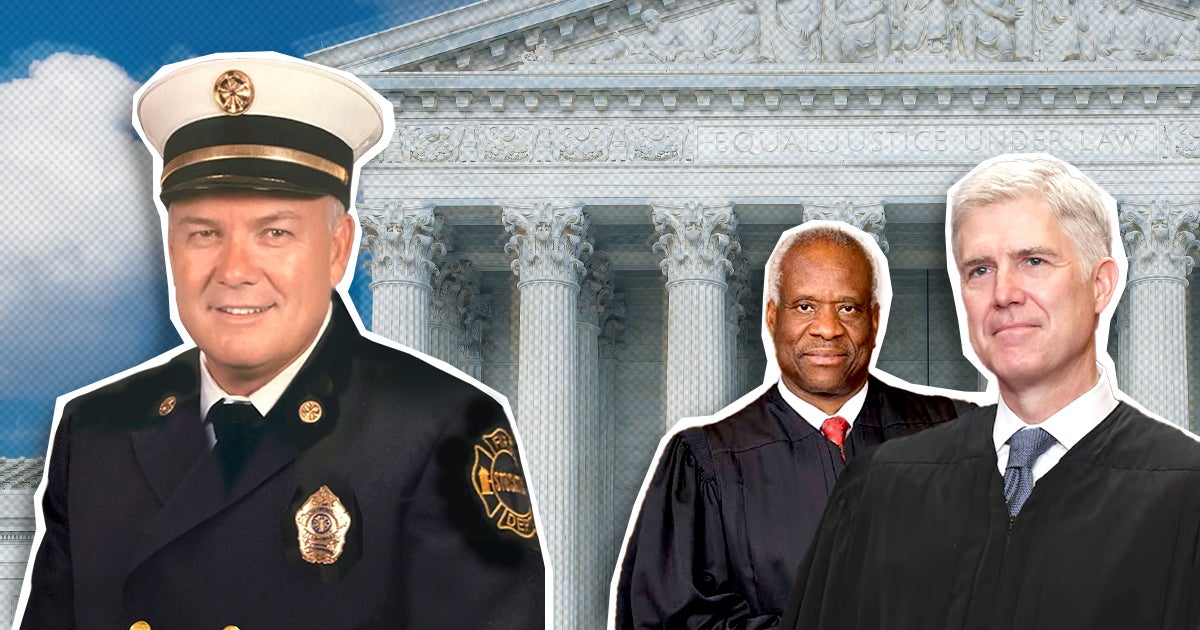
by Jayla Ward and Jorge Gomez • 3 minutes
The U.S Supreme Court recently issued an important decision in Ames vs. Ohio, a case about a woman who claimed she was unlawfully discriminated against because she is heterosexual.
The Court unanimously ruled that the law prohibits discrimination and the legal standards do not vary based on whether or not the plaintiff is a member of a majority group.
While this case wasn’t about religious freedom, the ruling could impact employment discrimination cases involving religion.
Justice Clarence Thomas, along with Justice Neil Gorsuch, wrote a concurring opinion in which they cited, multiple times, First Liberty’s case involving Fire Chief Ron Hittle. If you recall, Fire Chief Hittle brought a religious discrimination lawsuit after he was fired for attending a leadership conference that took place at a church.
In their concurrence, Thomas and Gorsuch reference Fire Chief Hittle’s case to argue that there are must-needed changes to the way that courts review employment discrimination cases.
This isn’t the first time the justices have pointed to Fire Chief Hittle’s case to explain that it’s time to review decades of bad precedent in this area of the law. In March, the Supreme Court declined to hear the Hittle case. However, Justices Thomas and Gorsuch attached a rare dissenting opinion.
The two justices explained that the Court should have taken our case, as it presented an opportunity to revisit a confusing legal doctrine. The 1973 case McDonnell Douglas Corp v Green has caused issues in the lower courts for 50 years.
McDonnell Douglas is a judge-made framework designed to help judges evaluate discrimination claims in certain situations. However, it was only intended to be used in court cases where judges would be deciding the facts instead of juries.
Over time it has ballooned into a series of unnecessary hurdles for people who have faced discrimination at work. It is now used as the default method for handling Title VII cases (like religious discrimination in the workplace). It often has the result of killing meritorious cases before they even get the chance to be heard by a jury.
“I am not aware of many precedents that have caused more confusion than this one,” Justice Thomas stated in his dissent.
Justices Thomas and Gorsuch echo that same point in their concurrence in Ames. They emphasize that this framework has negatively impacted many cases, including Fire Chief Hittle’s.
Our case with Fire Chief Hittle appears to have made an impact on at least two justices. Could this mean that the Court is ready to review McDonnell Douglas and possibly correct decades of confusing legal precedent?
If this framework gets reviewed, it could impact multiple First Liberty cases concerning religious discrimination in the workplace.
We’re fighting in federal appeals court for our clients Lacey Smith and Marli Brown, two flight attendants who were fired by Alaska Airlines for expressing their religious beliefs and convictions in a company forum.
The University of Michigan Health System fired physician assistant Valerie Kloosterman. Why? Because she was unwilling to use biologically incorrect pronouns to refer to her to patients or to refer patients for transgender procedures, both of which conflicted with her Christian faith and medical judgement. First Liberty argued the case in federal appeals court and we’re awaiting a decision.
Connecticut schoolteacher Marisol Arroyo-Castro has not been allowed to return to the classroom because she refused to take down a small crucifix she keeps at her desk. After teaching for 30 years, she’s being threatened with termination. First Liberty sued the school district and reported it to the Equal Employment Opportunity Commission over its wrongful and illegal actions.
Whiles these cases are ongoing, First Liberty has secured tremendous victories for people of faith in the workplace.
Through our landmark victory for Coach Joe Kennedy, the Supreme Court set a precedent affirming that teachers, coaches and public employees have an equal right to express their religious beliefs, even in view of students.
In our Faithful Carrier case involving Gerald Groff, the U.S. Supreme Court issued a monumental ruling, strengthening the right of employees across the country to receive religious accommodations.
The Supreme Court’s rulings have made a huge and favorable impact for the right of religious employees. Even so, the battle for religious freedom in the workplace isn’t over. Far from it.
We have a lot of legal battles ahead and need support to deliver a victory in our cases. Our cases could set precedents that protect millions of religious Americans at work.
Please give to First Liberty today.